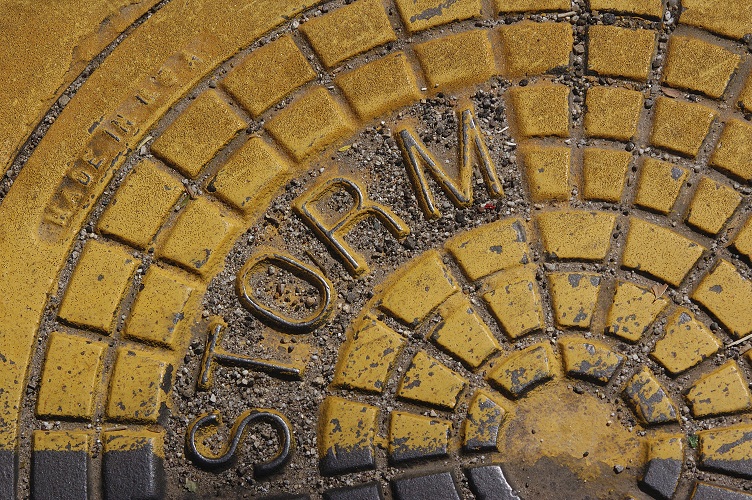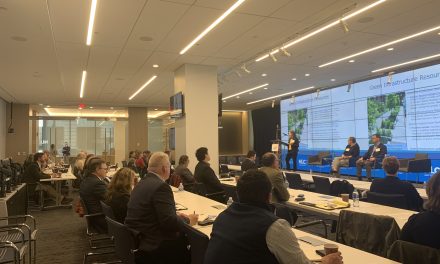The Water Leadership Institute (WLI) program developed by the Water Environment Federation (WEF; Alexandria, Virginia) is an intensive, 7-month training seminar, aiming to teach management skills to the water workforce and help lay the groundwork for strong professional networks. The curriculum incorporates lessons about both managing personnel and addressing broader water-sector challenges.
While most of the WLI program’s nearly 350 alumni have come from the wastewater treatment community, the seminar is by no means geared specifically toward wastewater. Since the program’s introduction in 2012, several stormwater professionals have completed the seminar, graduating with new skills that help them better navigate the increasingly complex and fast-paced stormwater management landscape.
Applications are now being accepted for the Water Leadership Institute Class of 2021 through January 14. Read on for perspectives from three stormwater-sector WLI alumni who detail how participating in the program helped enhance their professional aptitude.
Matt Wooten, Environmental Scientist
Oftentimes, the engineering considerations of managing stormwater flows may be well-established, but the science associated with the impacts those same flows will have on receiving streams is less clear. A major challenge for the stormwater sector is bringing the two disciplines – science and engineering – together, so that leadership can make informed decisions regarding policy.

My role at Sanitation District No. 1 (SD1) of Northern Kentucky is that of the scientist. I’ve spent more than a decade researching how streams in the SD1 service area respond to increased flows from stormwater runoff, and how they react to management techniques that attempt to mitigate these larger, more frequent flows. We have monitored streams, analyzed data, given presentations, and published our results in peer-reviewed journals to validate and add credibility to our work. We’ve even partnered with local, state and federal agencies, as well as private companies, to conduct pilot studies that have supported our theories.
But still, we struggled to communicate how to best utilize this data and apply the underlying science throughout our stormwater management program. The desire to see this work reach its full potential and lead my agency into the future inspired me to explore leadership development opportunities, which led me to the WLI.
As part of the WLI, I had access to industry leaders who were there to help me develop the skills I needed to move forward, whether that be through a project, a program, or just communicating ideas more effectively.
The WLI has also helped me to become more self-aware. Thanks to insights gleaned from the program, I now better understand my own communication style and personality, as well as those of my colleagues. I am now better able to tailor messages to the individual needs of a single person or a group of people. The WLI helped me to recognize the unconscious bias we all tend to have regarding various topics, and I can now recognize those biases and move past them.
Since graduating from the WLI in 2019, I have used the skill set I developed through the program to move into a comprehensive planning role at SD1, giving me the opportunity to apply the science we have spent so much time developing. Without a doubt, the skills I developed in the WLI have helped propel me into this new and challenging role.
Kerry Reed, Stormwater Engineer
Back when I was an environmental engineering major, it seemed like every class was about “poop water”.
Since I didn’t want a career in wastewater treatment, I had a hard time picturing a role for myself in the water industry. It took me several years before I found amazing mentorship that lead me into stormwater management. How I wish I had an opportunity like the WLI to discover that there are so many opportunities in the water industry beyond “poop water”.

The WLI program aims to provide opportunities that enable developing and emerging leaders to build strong, lasting relationships within the whole water industry — not just among drinking water and wastewater practitioners. The diversity of the class is probably the strongest aspect of the program —professionals from across the country (and even international participants), from different sectors of the water industry, and in different stages of their careers. Stormwater still feels like the “little sister” to water and wastewater, but it was encouraging to have a few stormwater managers in our class, to learn how to better incorporate our work in traditional utilities, and to share our perspectives with our classmates.
WLI was not what I expected. It was energizing to be surrounded (even virtually) with people who shared my passion for improving water. It was also refreshing to hear stories of the same frustrations about our work with helpful solutions. I learned so many tricks and techniques for dealing with co-workers and the general public that I can’t wait to use. But mostly I learned more about me — about my strengths and weaknesses, about my blind spots, and about how to be a more valuable member of my team.
We often get so busy with our day-to-day jobs, that we forget the power of connecting with our peers. WLI helped me see our profession and industry from new points of view. WLI forced me to slow down and reconnect. And in the chaos and craziness that was 2020, that was exactly what I needed.
Garrett Bergey, Program Manager
As a recent graduate of the WLI, I highly recommend the program to stormwater professionals ranging from municipalities, to consultants, regulators, and beyond.
The WLI dramatically grew my network, connecting me with water professionals from across the country working in all facets of the industry. I have already leaned on this network and know that I will continue to do so in the future.

The program helped me advance my leadership abilities and pushed me to have difficult — but rewarding — conversations with myself and others. The knowledge that I gained about my strengths and weaknesses, as well as my biases and blind spots, have helped me be a more effective leader, communicator, and team member.
These skills are particularly important for stormwater professionals. I often find myself balancing the needs of my clients in order to meet their various stormwater compliance requirements while staying within their often-underfunded budgets. I suspect that many others in the industry have had similar experiences. I know that at times those interactions can be difficult and can feel combative. Being an effective and tactful communicator can make those interactions much more positive, allowing everyone to see that we all want the same thing — clean water for our communities to drink and recreate in.
The WLI definitely has improved my toolbox for handling these hard conversations and situations and I am so glad that I had the opportunity to participate. I look forward to continuing to contribute to the WLI as I want to share the same wonderful experience that I had with others.







